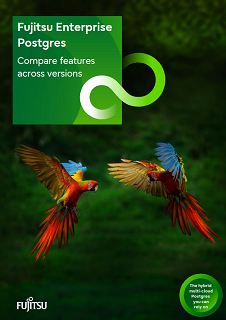| Feature |
PostgreSQL
18 |
Fujitsu Enterprise Postgres |
What does this do? |
|
|
|
|
| Generative AI for enterprise |
|
|
|
|
|
Build data infrastructure that can be used safely and easily for AI applications. The pgvector extension allows vector data to be safely stored and protected by Fujitsu's enterprise security features.
|
| Knowledge Data Management |
|
|
|
|
|
Search knowledge data in three ways -text semantic search, vector similarity search, and graph traversal-, in addition to traditional search methods.
|
| RAG application development |
|
|
|
|
|
Integration with the RAG development framework LangChain simplifies the creation of applications powered by large language models (LLMs).
|
| Hybrid search |
|
|
|
|
|
Combines the strengths of full-text search (which precisely locates documents with exact keyword matches) and vector search (which retrieves semantically relevant documents by capturing meaning and context).
|
| In-database inference |
|
|
|
|
|
Supports importing ONNX (Open Neural Network eXchange) models, enabling models trained in one framework to run inference directly in the database—so you can build RAG applications with your own AI models while keeping all data securely on your servers.
|
| Transparent Data Encryption (256-bit PCI DSS-compliant) |
|
|
|
|
|
256-bit encryption is one of the most secure encryption methods available as it uses a 256-bit key to encrypt/decrypt data.
|
| Data Masking |
|
|
|
|
|
Data Masking allows you to retain the actual structure of the data when sharing a database with sensitive customer information beyond the permitted production environment, such as for development and testing.
|
| Dedicated Audit Log |
|
|
|
|
|
This is a unique feature of Fujitsu Enterprise Postgres to deliver in the key areas of data accountability, traceability, and the ability to audit. It is also Payment Card Industry Data Security Standard (PCI DSS) compliant.
|
| Key management for Transparent Data Encryption |
|
|
|
|
|
Increased flexibility to use KMIP certified external Key Management Systems (KMS) for improved data security. Reduced risk of data leakage by storing encryption keys outside the database. Better governance by the division of role between the database administrator and the administrator for Master Encryption Keys. |
| Cloud-based key management |
|
|
|
|
|
Allows you to store Transparent Data Encryption keys in cloud key management services. Supports plug-ins to call communication adapters in the cloud and to share data encryption keys.
|
| Confidentiality management |
|
|
|
|
|
Simpler operations for role-based access control (RBAC) setting and audit. Easier and more efficient security operations, and reduced human errors, minimizing security risks.
|
| Policy-based login security |
|
|
|
|
|
Prevents unauthorized logins and improves database security by setting password expiration dates and locking users who repeatedly fail to log in or are dormant to restrict access to their accounts.
|
| FIPS compliance |
|
|
|
|
|
Allows you to use algorithms approved by the Cryptographic Module Security Requirements (Federal Information Processing Standard) 140, designed to ensure strengthened data encryption and communication security.
|
| Anomaly detection |
|
|
|
|
|
This enables you to identify suspicious items, events, or observations based on the fact they differ from the majority of the data. These can often be problems such as fraud, a structural defect, or errors in text. |
| Integration with CryptoCard HSM |
|
|
|
|
|
The CryptoCard is a hardware security module (HSM) that protects your digital keys by storing them in separate hardware and is FIPS 140-2 Level4 certified.
|
| IBM Hyper Protect Data Controller |
|
|
|
|
|
Centralized access control by encrypting data into trusted data objects before leaving the system of record. This protection follows your selected data as it traverses the enterprise network and prevents unauthorized access at all locations and end points. |
| Vertical Clustered Index (VCI) |
|
|
|
|
|
Vertical Clustered Index (VCI) is Fujitsu's proprietary implementation of In-Memory Columnar Index that uses a parallel-processing engine to instantly update column-oriented data in response to changes in row-oriented data, and processes column-oriented data quickly.
|
| Global Meta Cache |
|
|
|
|
|
This is a unique feature of Fujitsu Enterprise Postgres that caches system catalog and table information in shared memory instead of in per-process memory.
|
| High-speed backup/ recovery |
|
|
|
|
|
One-click backup and recovery improves efficiency and mean time to recovery. Also back up and recover the cluster and selected tablespaces using any user-specified copy method. On IBM LinuxONE, zEDC hardware compression increases performance.
|
| High-speed data load |
|
|
|
|
|
Leverages the PostgreSQL COPY command by running it in parallel using as many workers as your available resources allow.
|
| Parallel Scanning and Aggregation |
|
|
|
|
|
Parallel processing is a method of breaking up and running program tasks simultaneously to reduce processing time. Data aggregation is a type of data and information mining process where data is searched, gathered and presented in a report-based format.
|
| zEnterprise Data Compression (zEDC) |
|
|
|
|
|
On-chip compression accelerator reduces disk usage by compressing backup data and archive logs at high speed. Hardware compression results in 40% performance improvement. |
| Multi-master replication |
|
|
|
|
|
Multi-master architecture ensures 24/7 business continuity by allowing read-write access from the nearest node for faster response, seamless scaling without downtime, and resilient operation across regions—even during failures.
|
| Mirroring Controller |
|
|
|
|
|
This is a unique feature to Fujitsu Enterprise Postgres that continually monitors your system and seamlessly switches online transaction processing to an alternate server to ensure business continuity when an abnormality is detected.
|
| Connection Manager |
|
|
|
|
|
This is a unique feature of Fujitsu Enterprise Postgres that allows application access and replication operation to be continued without being aware of the connection destination of the applications.
|
| Database Transaction Log Mirroring |
|
|
|
|
|
Transaction records are continuously streamed from the primary database to the standby database. This secures your transaction logs. |
| WAL duplication |
|
|
|
|
|
Solves PostgreSQL's single point of failure.
|
Smart setup
(Create Master/ Standby/ Standalone) |
|
|
|
|
|
Leverage the smart setup features to setup your database quickly and efficiently often saving time and money as well as ensuring correct setup from the start. |
| Easy backup/ recovery |
|
|
|
|
|
Utilize extensive data backup and recovery features to protect yourself in the case of data loss due to any number of events including deletion and corruption. |
| Instance configuration/ management |
|
|
|
|
|
A database instance refers to the set of structures that manage database files and its associated data and then serves them to users. |
| Easy setup (installer) |
|
|
|
|
|
PostgreSQL has offered an installer system since version 8.0 to make the process easier and faster. |
| Easy cluster setup and management (with Mirroring Controller) |
|
|
|
|
|
This enables several servers or instances (collection of memory and processes that interact with a database, as in the actual files and processes) to connect to a single version of the database. |
| Support for COBOL applications |
|
|
|
|
|
Fujitsu Enterprise Postgres allows you to execute SQL commands from your legacy COBOL programs with little to no modifications. Embedded SQL in COBOL programs is precompiled by ECOBPG, a library provided by Fujitsu, so that its output can be processed by any COBOL compiler.
|
| System usage statistics |
|
|
|
|
|
A network usage monitor enables users to review your database's utilization metrics and statistics to discover and manage the resource utilization of your database. |
| Enhanced GUI for cluster management |
|
|
|
|
|
Simplify the setup and management of streaming replication clusters. |
| WebAdmin |
|
|
|
|
|
The WebAdmin in Fujitsu Enterprise Postgres helps you easily manage your database and its contents saving time and money. |
| Rapid setup |
|
|
|
|
|
Save time and money by setting up the database quickly and easily. |
Interoperability
(ability to connect to older versions) |
|
|
|
|
|
Data interoperability means that the data you create can be utilized by any older versions of the platform you may have residing across the organization. |
Support for Embedded SQL
National Character Data in COBOL |
|
|
|
|
|
National character strings are synonyms for character strings or graphic strings that can be a sequence of bytes that represent character data in UTF-8 or UTF 16BE encoding in a Unicode database. |
| Support for variable format source code in COBOL programs |
|
|
|
|
|
Source code is the set of instructions and statements written by a programmer to be translated into machine language by a compiler. The translated code is the object code - and Fujitsu Enterprise Postgres supports a variable version of source code in COBOL applications. |





 Compare Fujitsu Enterprise Postgres features across versions
Compare Fujitsu Enterprise Postgres features across versions

